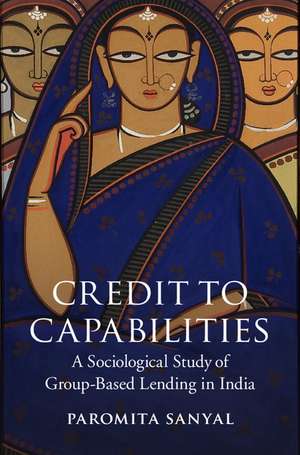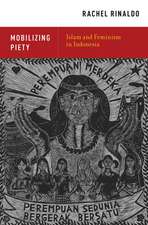Credit to Capabilities: A Sociological Study of Microcredit Groups in India
Autor Paromita Sanyalen Limba Engleză Paperback – 22 iun 2016
| Toate formatele și edițiile | Preț | Express |
|---|---|---|
| Paperback (1) | 238.52 lei 6-8 săpt. | |
| Cambridge University Press – 22 iun 2016 | 238.52 lei 6-8 săpt. | |
| Hardback (1) | 695.93 lei 6-8 săpt. | |
| Cambridge University Press – 10 dec 2014 | 695.93 lei 6-8 săpt. |
Preț: 238.52 lei
Nou
Puncte Express: 358
Preț estimativ în valută:
45.65€ • 49.57$ • 38.34£
45.65€ • 49.57$ • 38.34£
Carte tipărită la comandă
Livrare economică 23 aprilie-07 mai
Preluare comenzi: 021 569.72.76
Specificații
ISBN-13: 9781107434479
ISBN-10: 1107434475
Pagini: 336
Ilustrații: 15 b/w illus. 1 map 15 tables
Dimensiuni: 152 x 227 x 17 mm
Greutate: 0.45 kg
Editura: Cambridge University Press
Colecția Cambridge University Press
Locul publicării:New York, United States
ISBN-10: 1107434475
Pagini: 336
Ilustrații: 15 b/w illus. 1 map 15 tables
Dimensiuni: 152 x 227 x 17 mm
Greutate: 0.45 kg
Editura: Cambridge University Press
Colecția Cambridge University Press
Locul publicării:New York, United States
Cuprins
1. The global trajectory of microcredit; 2. Agency; 3. Converting loans into leverage; 4. The power of participation; 5. Microcredit and collective action; 6. Culture and microcredit: why socio-religious dimensions matter; 7. Loans and well-being; 8. Interpreting microcredit: beyond the salvation/exploitation alternatives; 9. Epilogue: the future of microcredit.
Recenzii
'Microcredit has been a major interest of development economists for years, given their effectiveness as an engine of upward mobility among the poor. Paromita Sanyal's remarkable book gives us a different lens on their importance. She reveals the critical role of microcredit in enabling women to build independent lives even in the face of traditional suppression. This engaging study should be read by students, scholars and policy makers who want to know how this strategy can make a profound difference for women in developing countries.' Katherine Newman, Provost, University of Massachusetts, Amherst, and author of Taxing the Poor: Doing Damage to the Truly Disadvantaged
'The remarkable global phenomenon of microcredits has finally found its wise analyst. Drawing from hundreds of vivid interviews with Indian women, Paromita Sanyal offers bold explanations of when, how, and in what ways microcredits enhance female autonomy. Credit to Capabilities contributes fresh insights to the study of economic activity and household gender dynamics.' Viviana A. Zelizer, Lloyd Cotsen '50 Professor of Sociology, Princeton University, and author of The Purchase of Intimacy and Economic Lives
'Credit to Capabilities is a major contribution to our understanding of the social impact of microcredit on the ability of women to gain autonomy in various spheres of their lives. This qualitative study adds considerable nuances to existing analyses on the topic by parsing out who benefits, when, how much, and how. Sanyal's book is of broad sociological significance as a model for approaching agency and social change. A must-read for students of gender, development, economic sociology, family, deliberation, and much more.' Michele Lamont, Director, Weatherhead Center for International Affairs, Harvard University
'The remarkable global phenomenon of microcredits has finally found its wise analyst. Drawing from hundreds of vivid interviews with Indian women, Paromita Sanyal offers bold explanations of when, how, and in what ways microcredits enhance female autonomy. Credit to Capabilities contributes fresh insights to the study of economic activity and household gender dynamics.' Viviana A. Zelizer, Lloyd Cotsen '50 Professor of Sociology, Princeton University, and author of The Purchase of Intimacy and Economic Lives
'Credit to Capabilities is a major contribution to our understanding of the social impact of microcredit on the ability of women to gain autonomy in various spheres of their lives. This qualitative study adds considerable nuances to existing analyses on the topic by parsing out who benefits, when, how much, and how. Sanyal's book is of broad sociological significance as a model for approaching agency and social change. A must-read for students of gender, development, economic sociology, family, deliberation, and much more.' Michele Lamont, Director, Weatherhead Center for International Affairs, Harvard University
Notă biografică
Descriere
This book focuses on how group-based microcredit programs in India facilitate women's empowerment through the mechanism of group participation and networking.















